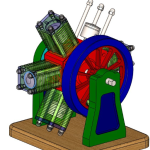Overview:
This course offers an in-depth look at advanced vibration engineering concepts and analytical techniques. It covers essential topics such as vibration theory, system modeling, vibration control, and diagnostics. Participants will learn how to analyze complex vibration phenomena in mechanical systems and structures, equipping them with skills to improve system reliability, performance, and lifespan.
Course Objectives:
- Develop a strong theoretical understanding of vibration engineering principles.
- Equip participants with analytical tools for vibration measurement and diagnostics.
- Learn to design and implement vibration control and isolation solutions.
- Understand the impact of vibrations on mechanical components and structures.
- Apply vibration analysis techniques to optimize system performance and prevent failures.
Training Content:
- Fundamentals of Vibration Theory: Understanding single and multi-degree-of-freedom systems.
- Modeling and Simulation: Techniques for representing vibrating systems mathematically.
- Vibration Measurement and Diagnostics: Tools and techniques for detecting and diagnosing vibration issues.
- Vibration Control and Isolation: Methods for reducing unwanted vibrations in mechanical systems.
- Advanced Topics: Modal analysis, spectral analysis, and signal processing.
- Case Studies and Applications: Practical applications of vibration analysis in industrial settings.
Target Audience:
This course is ideal for mechanical and structural engineers, maintenance engineers, reliability engineers, and technicians involved in the analysis, design, and maintenance of mechanical systems affected by vibration. It is also suitable for professionals in industries like manufacturing, automotive, aerospace, and energy, who aim to enhance their expertise in vibration engineering and analysis.






